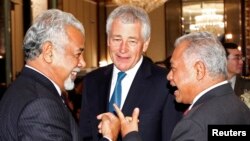Defense officials from the Asia Pacific region have begun an annual security forum with talks focusing on cyber security, maritime territorial disputes and North Korea's nuclear program.
U.S. Defense Secretary Chuck Hagel said he will address cyber security Saturday in his speech to the Shangri-La Security Dialogue in Singapore. He told reporters on the plane to Singapore that the issue will also likely come up in a brief meeting with Chinese delegates on the sidelines of the conference.
Recent U.S. reports said that Chinese computer hackers have stolen data from dozens of Pentagon weapons programs and other defense technologies.
"There's only one way to deal with these issues and that's straight up," said Hagel. "We intend to use all these venues, and that closer cooperation and closer venue-building to hopefully get us in a position where we can get some better understanding, closer understanding of what these rules of the road are."
Vietnam's Prime Minister Nguyen Tan Dung said in a speech Friday that Southeast Asian nations need to find unity on the issue of the energy-rich South China Sea. He said any conflict could disrupt the region's economy and he urged all countries to agree on a code of conduct.
"Maritime security and safety, as well as the freedom of navigation, have indeed caused deep concern to the international community," said the prime minister.
China claims almost all of the South China Sea, which may be rich in oil and natural gas. Parts of the sea are also claimed by Taiwan, the Philippines, Brunei, Malaysia, and Vietnam, and territorial disputes in the waters are common.
U.S. Defense Secretary Chuck Hagel said he will address cyber security Saturday in his speech to the Shangri-La Security Dialogue in Singapore. He told reporters on the plane to Singapore that the issue will also likely come up in a brief meeting with Chinese delegates on the sidelines of the conference.
Recent U.S. reports said that Chinese computer hackers have stolen data from dozens of Pentagon weapons programs and other defense technologies.
"There's only one way to deal with these issues and that's straight up," said Hagel. "We intend to use all these venues, and that closer cooperation and closer venue-building to hopefully get us in a position where we can get some better understanding, closer understanding of what these rules of the road are."
Vietnam's Prime Minister Nguyen Tan Dung said in a speech Friday that Southeast Asian nations need to find unity on the issue of the energy-rich South China Sea. He said any conflict could disrupt the region's economy and he urged all countries to agree on a code of conduct.
"Maritime security and safety, as well as the freedom of navigation, have indeed caused deep concern to the international community," said the prime minister.
China claims almost all of the South China Sea, which may be rich in oil and natural gas. Parts of the sea are also claimed by Taiwan, the Philippines, Brunei, Malaysia, and Vietnam, and territorial disputes in the waters are common.





